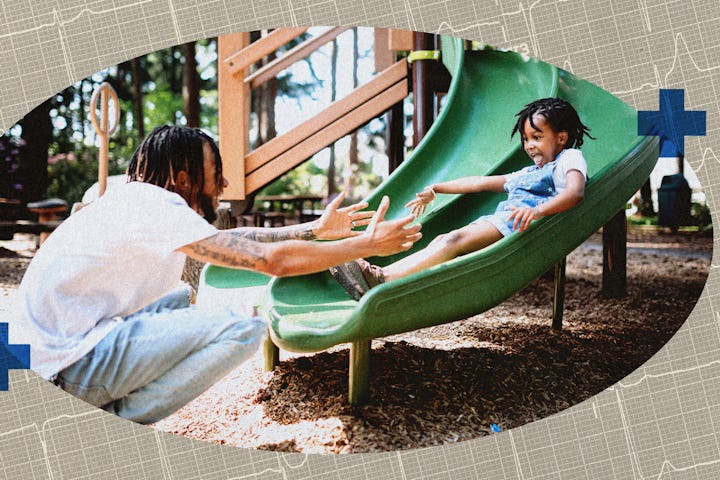Taking Risks Helps Kids Learn, But They Play It Too Safe When Parents Do This
To take risks, kids have to feel secure.

Taking risks is crucial for learning. Sure, parents are right to freak out if they see their kid steadying a ladder so they can get their frisbee off the roof. But risky play — thrilling types of play that involve a risk of physical injury — helps kids develop resilience, self-confidence, independence, executive functioning, and risk-management skills. Obviously, parents who are too overprotective will stunt kids’ growth in this area. But new research also indicates that kids who lack predictable support from adults are less willing to take risks — and therefore miss out on these opportunities for growth.
“If you're in a resource-rich environment — meaning for a child that you're safe, your meals are coming, someone is at home for you, you're surrounded by adults that are protecting you — you'll try new things. And that’s how you discover and learn about the world,” Seth Pollak, Ph.D., a University of Wisconsin–Madison professor of psychology who studies childhood adversity, said in a press release.
For the study, published in the Proceedings of the National Academy of Sciences, researchers observed more than 150 children between the ages of 10 and 13 playing two games designed for the study. One featured virtual orchards where kids collected apples. The kids received less fruit each time a player picked from a specific tree so researchers could determine whether kids would move onto other trees with unknown production potential or continue to pick from the familiar tree they started with.
Another game used specialty slot machines in which just one of the machines had a known history of giving players payouts. The other machine’s history was undisclosed, so investing game currency there was riskier — but also provided a potentially larger jackpot.
The kids and their parents also took surveys on factors like divorce, parental job security, family illness, and moving homes or schools, and the kids reported how reliable and predictable they felt their parents were.
“Kids from unstable backgrounds...prefer to stick with what they already know, even if it’s limited, rather than taking a chance at a higher possible reward.”
Kids who reported that their parents were less reliable and predictable were less likely to take exploratory risks while playing the games. “The children from more stable backgrounds play around and experiment in our games. They use that to get a sense of how things work, maybe earning them more money or more points,” Pollak said.
“Kids from unstable backgrounds just don't play that way. They stay within a narrower range of possibilities. They prefer to stick with what they already know, even if it’s limited, rather than taking a chance at a higher possible reward.”
“I think it makes sense,” Pollak continued. “Their brains are doing exactly what we want our brains to do, right? If you really feel things are not predictable and you don't know how things are going to land, you’d stick to what works and what's familiar. You wouldn’t waste your resources on something that could all fall apart.”
Of course, risks aren’t limited to play time. Striking up a conversation with a new person can feel risky. Auditioning for a new team or a musical carries the risk of rejection. Standing up to peer pressure opens the door for social risks. If you want to raise a kid who can do all of these things and more, they have to feel comfortable taking risks, which means they have to feel like their parents are a safety net on which they can fall back.
“If you imagine a kid at the playground, and they're doing something kind of risky and their parent is completely not paying attention, the kid has to be really cautious.”
In a conversation with Fatherly last year, Tina Payne Bryson, Ph.D., a psychotherapist and bestselling co-author of The Whole-Brain Child, explained that helping kids feel safe and seen requires showing attentiveness to their emotional states, being inquisitive about what they’re thinking and feeling, and cutting down on distractions like cell phones that pull attention away from them.
“If you imagine a kid at the playground, and they're doing something kind of risky and their parent is completely not paying attention, the kid has to be really cautious,” Bryson said. “But if they see that their parent is watching them and non-verbally communicating, ‘You got this, I'm watching you,’ by nodding their head or smiling, then they can use their mental energy and their attention to explore and play.”
She added, “What that requires is seeing what your child is capable of and knowing when to protect and when to back off to let them take risks on their own.”
Bryson also acknowledged that even the most well-intentioned parents are bound to misstep at some point and yell at their kids or otherwise make them feel afraid or unsafe. But those occasional missteps aren’t deal-breakers and, in fact, provide opportunities to help kids see parents as reliable when they make amends.
“When I yell at my child — which creates a rupture in our relationship — I'm going to repair with them,” she said. “That communicates to kids that we will keep showing up for them.”
One concrete way to help your kids feel like you’re safe and reliable is by establishing routines, as kids feel more secure and confident when life plays out in a predictable manner. That predictability implicitly teaches kids that parents are reliable because expectations remain consistent.
So, although it sounds somewhat counterintuitive, helping kids feel secure encourages them to take more risks, which is helpful for their development. Being your kid’s rock can be challenging with the ebbs and flows of your own life and emotions, but it’s well worth the effort.